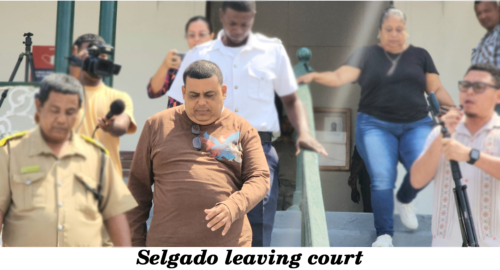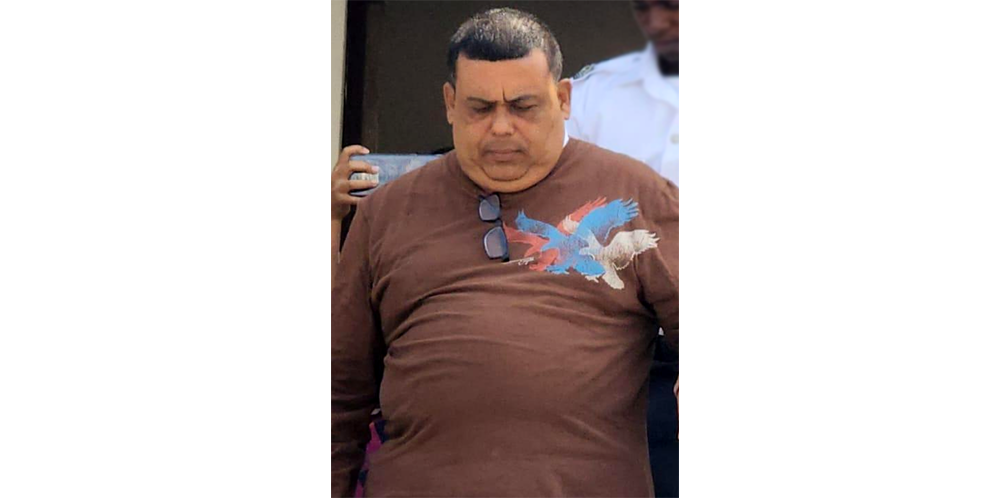by Roy Davis (freelance writer)
BELIZE CITY, Fri. Mar. 8, 2024
Attorney Oscar William Selgado, 54, took the verdict “like a man” today when Justice Nigel Pilgrim, after reading a judgement 40 pages long, told him that the court has found him guilty of abetment of murder. Selgado then asked Justice Pilgrim for 5 minutes for him to instruct his relatives how to handle the situation.
When he went back in the dock, Justice Pilgrim remanded Selgado into custody at Belize Central Prison until April 29 for sentencing. Justice Pilgrim has ordered an impact assessment statement, a social inquiry report, a psychology report and an antecedent history of the convict.
The maximum penalty for the offence is life imprisonment.

The evidence adduced by the Crown, represented by the Director of Public Prosecution, Cheryl Lynn Vidal, disclosed that on February 7, 2019, Giovanni Ramirez, after contacting Selgado by phone, met the attorney on Mahogany Street near to the Complex Building, and asked Selgado how much it would cost to represent him at a trial for which he is charged with firearm and ammunition offences. Selgado told him that the fee would be $4,000, and his reply was that he would have to pay in instalments. Selgado then told him that he would want a favour done and he doesn’t have to worry about paying the fee.
Selgado then told Ramirez that he wants an elderly woman, Marilyn Barnes, killed, and he showed Ramirez a photo of Barnes. Selgado told Ramirez that he wanted Barnes killed before March 14, 2019, because on March 14, Barnes is to testify before the General Legal Council about an allegation of him molesting a male minor, which could have him disbarred.
Ramirez told Selgado that he needed $1,500 to buy a gun, and Selgado gave him $500 and promised to give him the rest of the money. All this information came from a statement that Ramirez gave to the police, which was admitted as evidence. The statement was admitted as evidence after a voire dire was held, because Ramirez did not want to go to court to testify. Ramirez’s reason for not wanting to testify was that he feared for his life.
Ramirez met Selgado several more times, and on two occasions Selgado gave Ramirez $500 first and $800 afterwards. Selgado had also taken Ramirez to an apartment building on Southern Foreshore and had told Ramirez that Barnes lived in an apartment at the building.
It was when the time was nearing March 14 and no attempt was made to kill Barnes that Selgado set up a meeting with Ramirez. At that meeting Ramirez attempted to blackmail Selgado by demanding $1,000 for audio and video conversations between himself and Selgado that he had recorded on his cell phone. Selgado agreed to pay the money in return for the cell phone with the incriminating evidence, and a meeting was set for the following day at the usual meeting place next to the Complex Building. But Ramirez became suspicious when he arrived at the meeting place and noticed a vehicle that he was unable to identify; and he left.
Fearing that his life was in danger, Ramirez took the matter to the Commissioner of Police, Chester Williams, who instructed the then Inspector of Police, Wilfredo Ferrufino, to investigate. Ferrufino recorded a statement from Ramirez and later arrested and charged Selgado.
Williams and Ferrufino testified at the voire dire and at the main trial. They were both deemed as credible witnesses.
At the main trial, Williams and Ferrufino testified that they listened to audio recordings from Ramirez, and they were able to recognise Selgado’s voice telling Ramirez that he wanted Barnes dead. Their testimonies were secondary evidence, because the discs that contained the recordings were missing and could not be played in court.
Selgado testified at the voire dire and the main trial. His testimony at the voire dire was that he doesn’t know Giovanni Ramirez, and he has never interacted with anyone by that name. But Justice Pilgrim did not believe him, because there were certain things in Ramirez’s statement that he could have only gotten from Selgado.
Selgado’s testimony at the main trial was that he has no reason to want Barnes dead, and the only Giovanni Ramirez he knows was a cousin of his by that name. He said he did read his disclosure at the preliminary inquiry, and he was not given any audio tapes.
Selgado was represented by attorney Adolph Lucas, Sr.

